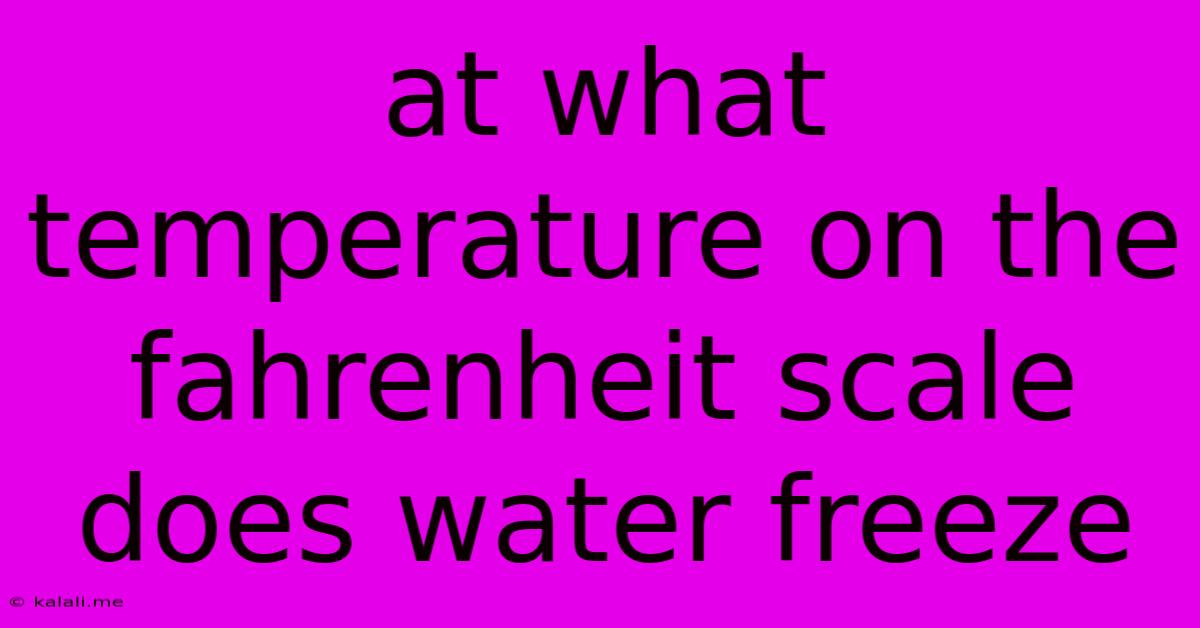At What Temperature On The Fahrenheit Scale Does Water Freeze
Kalali
Jun 14, 2025 · 3 min read

Table of Contents
At What Temperature Does Water Freeze on the Fahrenheit Scale?
Water freezes at 32 degrees Fahrenheit (32°F). This is a fundamental fact of science and a crucial benchmark for understanding temperature scales. This article will delve deeper into the concept of freezing points, exploring why water freezes at this specific temperature and the implications of this phenomenon.
Water's freezing point is a critical aspect of various scientific fields, from meteorology to chemistry, and impacts our daily lives significantly. Understanding this temperature is crucial for various practical applications, ranging from food preservation to infrastructure design in colder climates.
Understanding the Freezing Point of Water
The freezing point of water is the temperature at which it transitions from a liquid state to a solid state (ice). This transition occurs when the water molecules lose enough kinetic energy to form a stable crystalline structure, the characteristic structure of ice. The temperature at which this happens depends on the pressure; however, at standard atmospheric pressure, this point is consistently 32°F.
Why 32°F? The History of Fahrenheit
The Fahrenheit scale, devised by Daniel Gabriel Fahrenheit in the early 18th century, uses the freezing point of water as one of its defining points. Fahrenheit originally set 0°F as the temperature of a brine solution (water, ice, and ammonium chloride) and 96°F as the average human body temperature. Later adjustments refined the scale, setting the freezing point of water at 32°F and the boiling point at 212°F at standard atmospheric pressure.
Implications of Water's Freezing Point
The freezing point of water has profound implications across numerous fields. For instance:
- Weather and Climate: The freezing point of water is a critical factor in weather forecasting and climate modeling. Knowing when temperatures fall below 32°F helps predict frost, ice formation, and winter storms.
- Engineering and Construction: Engineers and architects must consider the freezing point of water when designing structures in cold climates. Pipes, roads, and buildings must be designed to withstand the expansion of water as it freezes.
- Food Science and Preservation: Freezing is a common method of food preservation. Understanding the freezing point of water is essential for properly storing food and maintaining its quality.
- Biology and Ecology: The freezing point of water influences the survival of organisms in cold environments. Many organisms have developed strategies to cope with freezing temperatures.
Factors Affecting the Freezing Point
While 32°F is the standard freezing point for water, various factors can influence this temperature slightly. These include:
- Pressure: Increased pressure lowers the freezing point of water.
- Dissolved impurities: The presence of dissolved substances, such as salts, can lower the freezing point. This is why adding salt to icy roads helps to melt the ice.
- Water purity: Extremely pure water may supercool and remain liquid below 32°F under specific conditions.
In conclusion, understanding the freezing point of water – 32°F – is crucial for comprehending numerous natural phenomena and technological applications. This seemingly simple temperature plays a vital role in shaping our environment and influencing our daily lives. From weather patterns to food preservation, the implications of water freezing at 32°F are far-reaching and fundamental to our understanding of the world around us.
Latest Posts
Latest Posts
-
Which Statement Describes How The Van Allen Belts Are Formed
Jun 14, 2025
-
Is The Peru Current Warm Or Cold
Jun 14, 2025
-
Specific Weight Of Water Kn M3
Jun 14, 2025
-
Who Is The Founder Of Yoga
Jun 14, 2025
-
What Has Mass And Occupies Space
Jun 14, 2025
Related Post
Thank you for visiting our website which covers about At What Temperature On The Fahrenheit Scale Does Water Freeze . We hope the information provided has been useful to you. Feel free to contact us if you have any questions or need further assistance. See you next time and don't miss to bookmark.